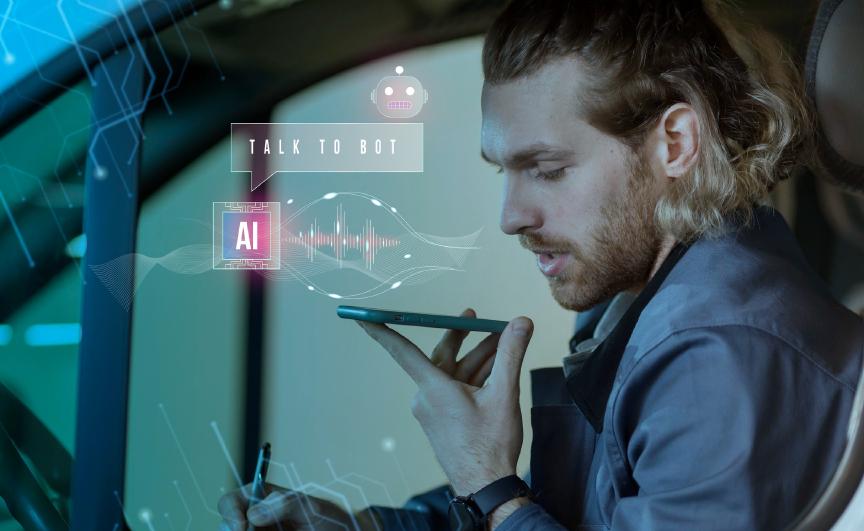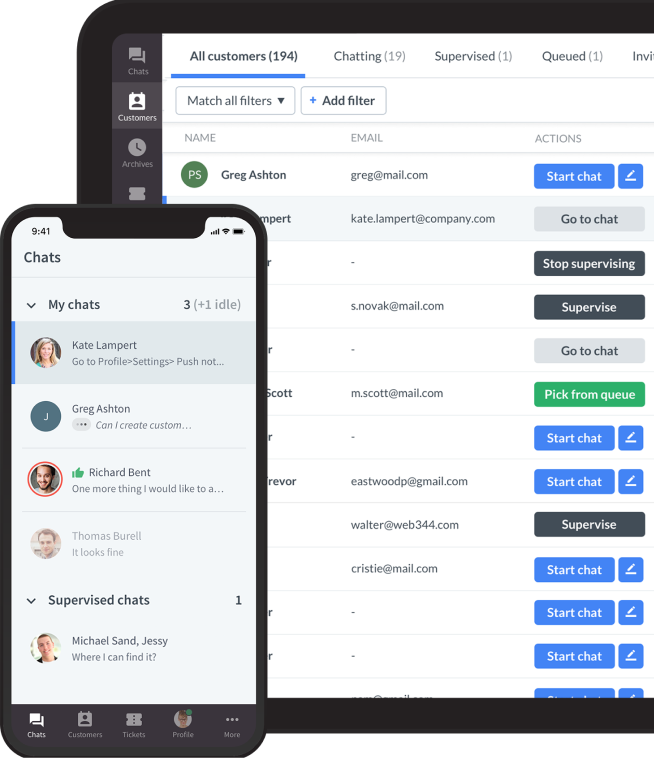
Some people fear automation and AI and others want to overuse it. Whatever your relationship is with AI, research shows that human-like AI can be highly beneficial in customer service.
A study conducted by Solvvy shows that approximately 80% of users will use chatbots when the option is available. According to CGS, 44% of customers want companies to make contacting a human easier.
These statistics illustrate the need for a careful balance when incorporating AI into customer service. Let’s learn more about AI and its use in customer service.
Robotic process automation in customer service
Technology has significantly changed various departments, teams, and even business processes and systems over the last two decades. Many products and services, including our platform, integrate AI as a core product feature.
This trend will continue, significantly changing customer service operations and teams. Specifically, four major trends to know about the rise of AI in customer service.
Better support teams
Effective support strategies have limitations due to the human constraints of agents and technicians who can only handle a limited number of daily requests, questions, or issues.
When an excellent human support team embraces AI's full data processing power, it leads to incredible outcomes such as improved service, reduced costs, and a better customer experience. Integrating AI with support teams is just the beginning, and AI has much more potential for the future.
How human agents and AI work together
There are several ways in which support agents and AI, or automated systems, can collaborate using current technology. These include AI technologies like:
-
Automated chatbots. These can answer simple questions without needing a human agent.
-
AI-assisted resolution. This involves providing prepared responses and answers for agents in real time to help them resolve customer issues more efficiently.
-
Intelligent request routing. This ensures that every question is directed to the right person who can answer it effectively.
-
Bot-powered scheduling. This allows seamless scheduling of appointments, calls, and bookings.
Learn more here about how AI chatbots can help your agents succeed.
Machine learning for proactive support
Imagine using software and struggling to understand how a particular feature works. You keep going back and forth, trying to figure it out, but you can't get it right.
Suddenly, a message appears on your screen, answering the exact question you had in mind even before you asked it.
This is the incredible power of proactive support. Advanced machine learning algorithms can monitor customer activity and identify issues before they arise.
A customer support platform can send customers support messages, reminders, and tips to anticipate their upcoming needs.
This shift to proactive support eliminates the need for a large team of on-call agents who manually go through logs every hour of every day.
Omnichannel support
As more businesses adopt proactive support strategies, most will provide an omnichannel customer support experience. With the help of technology, it is now possible to gather input from a support AI and send out active messages and notifications to users in real time across various channels.
These messages can be delivered via text, email, in-app, push notifications, or letters.
What used to require significant resources to achieve - real-time, omnichannel support - can now be integrated into a single software capable of handling issues, answering questions, and routing requests simultaneously.
The concept of every customer's needs being anticipated and addressed without human intervention might seem like something out of science fiction.
Even with advanced AI and technology, the human support team still has a vital role in the process.
The support team manages and deploys these tools in an AI-powered customer support operation. They shape the customer experience.
Customer experience over customer service
Customer service involves addressing customer inquiries and resolving issues as they arise.
However, with the advent of AI, support teams can shift from reactive support to proactive activities and processes that meet customer needs before they occur.
This shift will reduce the time, effort, and costs associated with the business process of directly serving customers, as many of their issues will be resolved before they even reach out for support.
Service team
The support team can focus on other essential tasks with fewer inquiries and support requests. They are responsible for comprehending the customer journey as a continuous process, starting from the point of initial awareness. Their job is to take active measures to shape that process discovery experience as smoothly and delightfully as possible.
Emotional intelligence
AI-powered customer service technologies can now analyze vast amounts of data to deliver personalized and empathetic responses to customer queries. This makes it possible to integrate deep learning and empathy into customer service.
Emotional intelligence is a crucial component of providing empathetic customer service.
Thanks to advancements in emotion detection technology, AI-powered customer service tools can now accurately read and comprehend human emotions.
These cognitive technologies will ultimately result in more efficient and empathetic customer service experiences in the days to come.
How AI automation and bots improve customer support
AI automation and bots offer quick and accurate responses to customers' queries for a seamless experience. Additionally, they are available 24/7, making support always accessible.
Moreover, AI and bots are proficient at repetitive tasks and handling complex issues. They use advanced algorithms to analyze data and provide comprehensive solutions. Are you in need of fast and precise replies? Look no further than AI and bots in customer service automation!
These technological advancements are revolutionizing the industry by improving efficiency and elevating customer satisfaction. In the following sections, you'll see how they can achieve it.
Artificial intelligence helps with assistance, availability, and accuracy
AI-powered bots are beneficial as they can provide instant assistance by offering relevant solutions or information. This saves a lot of time and frustration.
One of the significant advantages of AI-driven bots over human agents is that they are available around the clock. This means you can always rely on them for quick assistance no matter what time of day it is or if it's a weekend or a public holiday.
Another advantage of bots is that they are intelligent automations that can help decrease human errors. Bots are programmed with vast amounts of data and algorithms that ensure consistent response accuracy.
Cultural differences and multilingual support
Language barriers become a thing of the past with AI and bot support. These days, businesses can communicate with customers in multiple languages through AI-powered customer service and automation technologies.
This helps to create a smoother experience for customers from all regions, as they can receive assistance in their preferred language.
With the help of AI and bots, businesses can overcome language and cultural barriers and provide a seamless customer experience.
One of the most essential features of AI-powered customer service automation is language translation. By using advanced natural language processing algorithms, these systems can accurately and instantly translate customer queries.
This means that no matter the customer's language, their needs can be easily understood and addressed. This saves time for the customer and the support agent and eliminates any potential miscommunication caused by language differences.
AI and bots are highly effective in providing personalized support about cultural sensitivity. These systems are programmed to be culturally aware and adjust their responses accordingly.
By detecting cultural cues in customer inquiries, they can tailor their replies to align with cultural norms, preventing misunderstandings or offending remarks.
For instance, an AI-powered bot can recognize different societal norms around politeness in various cultures and tone down its responses when dealing with customers from such cultures.
This level of artificial intelligence focuses on cultural sensitivity, which helps promote trust between businesses and their global customers, ensuring that every interaction feels respectful and inclusive, irrespective of cultural background.
Personalization
AI systems can analyze customer data through advanced machine-learning techniques and personalize their responses accordingly. This robotic process automation improves response accuracy and enhances customer experience by providing tailored recommendations or solutions.
Make sure your customers feel valued and heard by maintaining a personalized experience with the help of AI and bots in customer service automation. AI can generate tailored suggestions relevant to their needs by analyzing data gathered from past purchases or inquiries.
AI can generate tailored suggestions relevant to their needs by analyzing data gathered from past purchases or inquiries. Bots are computer programs that can simulate human-like interactions and conversations.
They use natural language processing to understand customers' responses conversationally, making customers feel like they are interacting with real people. Bots can remember previous conversations and context, which helps seamlessly pick up where the customers left off.
Conclusion
The future of customer service will involve AI and automation technologies. While some may fear the overuse of these technologies, research shows that human-like AI can greatly benefit customer service. The statistics speak for themselves, with approximately 80% of users willing to use chatbots and 44% of customers wanting companies to make contacting a human easier.
The incorporation of AI into customer service requires a careful balance. By combining human support teams' strengths with AI's data processing power, businesses can achieve improved service, reduced costs, and an overall better customer experienceexperience for customers. AI technologies such as automated chatbots, AI-assisted resolution, intelligent request routing, and bot-powered scheduling can enhance the efficiency and effectiveness of support teams.
Machine learning algorithms enable proactive support, allowing businesses to anticipate customer needs and provide timely assistance. Anticipating and addressing customer needs without human intervention is no longer science fiction.
With AI-powered customer service, language barriers become a thing of the past, as businesses can communicate with customers in multiple languages. AI systems can analyze customer data and provide tailored recommendations, enhancing the personalization of customer support.
As we continue to advance, discussing the role of AI and automation technologies in our lives becomes increasingly essential. Rather than attempting to deceive users into thinking they're conversing with humans, the objective is to establish AI interactions that are just as helpful, empathetic, and efficient as human interactions. Ethical concerns should be at the forefront, ensuring transparency and preserving user trust.
Get a glimpse into the future of business communication with digital natives.
Get the FREE report




